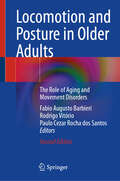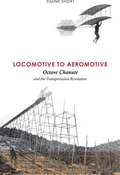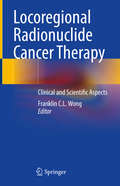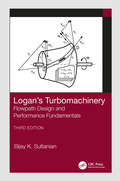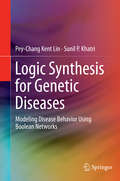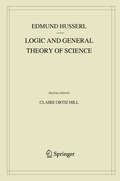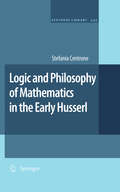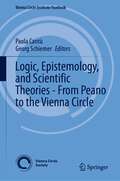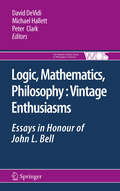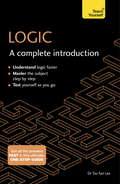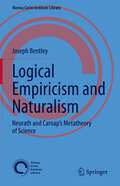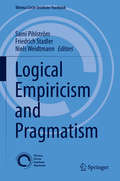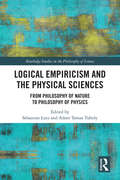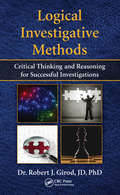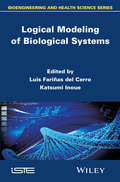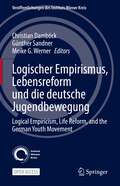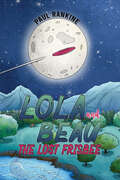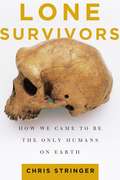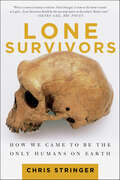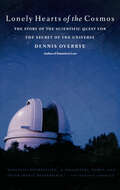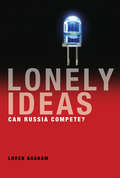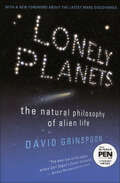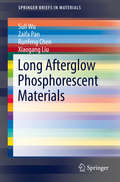- Table View
- List View
Locomotion and Posture in Older Adults: The Role of Aging and Movement Disorders
by Fabio Augusto Barbieri Rodrigo Vitório Paulo Cezar Rocha dos SantosThis book sheds new light on the effects of aging and movement disorders on movement control during walking and postural tasks. Understanding these dynamics is more important than ever as we face a future where the number of older adults is projected to double by 2050. The severity of this framework is exacerbated when aging is accompanied by movement disorders such as Parkinson's disease, Chorea, Multiple Sclerosis, Dystonia, and Huntington's disease. The book explores how complex interactions between musculoskeletal and neural systems are required for efficient execution of daily activities like walking and maintaining posture. The chapters in this comprehensive volume address the multifaceted challenges posed by aging and movement disorders in gait and postural control, including innovative rehabilitation strategies and the role of artificial intelligence. Expert contributors examine how environmental, sensorial, motor, cognitive, and individual factors influence locomotor and postural activities. Readers will discover cutting-edge research findings that address critical questions about planning, performance, and impairment in these essential functions. This book is a must-read for anyone seeking to understand and reduce the effects of aging and movement disorders on gait and posture. This book is an invaluable resource for clinicians, physical therapists, occupational therapists, psychologists, biologists, researchers, health professionals, as well as those involved in physical education and sports medicine. It highlights the mechanisms involved in controlling and planning postural and gait tasks in both neurologically healthy older individuals and those who suffer from movement disorders, offering new perspectives on interventions and technologies designed to improve understanding or delay impairments due to aging or movement disorders on gait and posture. Whether you're a practitioner or researcher in related fields, this book equips you with the essential knowledge to enhance the quality of life for older adults facing these challenges.
Locomotive to Aeromotive: Octave Chanute and the Transportation Revolution
by Tom Crouch Simine ShortFrench-born and self-trained civil engineer Octave Chanute designed America's two largest stockyards, created innovative and influential structures such as the Kansas City Bridge over the previously "unbridgeable" Missouri River, and was a passionate aviation pioneer whose collaborative approach to aeronautical engineering problems helped the Wright brothers take flight. Drawing on a rich trove of archival material and exclusive family sources, Locomotive to Aeromotive is the first detailed examination of Chanute's life and his immeasurable contributions to the fields of engineering and transportation, from the ground transportation revolution of the mid-nineteenth century to the early days of aviation. Aviation researcher and historian Simine Short brings to light in colorful detail many previously overlooked facets of Chanute's life, in both his professional accomplishments and his personal relationships. Through the reflections of other engineers, scientists and pioneers in various fields who knew him, Short characterizes Chanute as a man who believed in fostering and supporting people who were willing to learn. This well-researched biography cements Chanute's place as a preeminent engineer, pioneer, and mentor in the history of transportation in the United States and the development of the airplane.
Locoregional Radionuclide Cancer Therapy: Clinical and Scientific Aspects
by Franklin C. L. WongThis book reviews locoregional radionuclide cancer therapies (LRCT). Proving an increasingly viable alternative to radiotherapy, radionuclide therapy includes a diversity of choices of well characterized biochemical and physiologic target molecules. The delivery and retention of radionuclides may be monitored by advanced imaging for exact tissue localization and for real-time dosimetry to enable personalized precision medicine. Radiopharmaceuticals in human cancer therapies are typically delivered in systemic routes but can also be designed for locoregional routes to harness pharmacokinetic advantages of higher payload and lower systemic toxicities. This book explores the latest advancements and clinical considerations of the locoregional approach.Throughout the chapters, the clinical and scientific bases of cancer treatment and the locoregional use of radionculides are explored. Mathematical models of radiation dosimetry of locoregional radionculdies on tissues are studied using common models for multiple commercially available radionuclides. Rodent and canine tumor models of LRCT are compared for selected radionuclides and radiopharmaceuticals. The practical aspects of radiopharmaceuticals production, marketing, transport, as well as radiation protection are reviewed. Finally, the combination of LRCT with immunotherapy and other cancer therapies and prospective future use of LRCT are discussed.This is a guide for practicing nuclear physicians, interventional radiologists, radiation oncologists, radiation scientists, veterinarians and oncologists to expand their knowledge base and to prepare for designing locoregional radionuclide cancer therapies in animals and in humans.
Logan's Turbomachinery: Flowpath Design and Performance Fundamentals, Third Edition (Mechanical Engineering)
by Bijay SultanianLogan's Turbomachinery: Flowpath Design and Performance Fundamentals, Third Edition is the long-awaited revision of this classic textbook, thoroughly updated by Dr. Bijay Sultanian. While the basic concepts remain constant, turbomachinery design has advanced since the Second Edition was published in 1993. Airfoils in modern turbomachines feature three-dimensional geometries, Computational Fluid Mechanics (CFD) has become a standard design tool, and major advances have been made in the materials and manufacturing technologies that affect turbomachinery design. The new edition adresses these trends to best serve today's students, and design engineers working in turbomachinery industries.
Logging Off: The Human Cost of Our Digital World
by Adele Zeynep Walton'You won't look at your screens in the same way after reading this book' Grace Blakeley, author of VULTURE CAPITALISM 'Logging Off is a life-saving book' Mikaela Loach, author of IT'S NOT THAT RADICAL'A harrowing but important read' Carole CadwalladrWe live in a digital world. In the 30 years since we've been online, we've created connections, crossed boundaries and discovered new worlds. We have done things generations before us could never have imagined. But at what cost?Growing up as a Gen Z, Adele spent endless hours as a teenager on social media, shaping her view of herself and the world. As a freelance journalist, she has used her social media platforms and digital technology to develop a career in an unfamiliar and competitive industry, benefitting from the opportunities that these spaces can offer. But after losing her sister to online harms, she realised that our current digital world is failing us.We are an anxious and discontent generation. Our lived realities and our online vulnerabilities are inextricably linked, and this means big business for social media tycoons who want us to stay scrolling at any cost. As Big Tech barons make their billions, capitalising on our emotions, instincts, insecurities and desires, everyday people are losing out.From workers being fired by algorithms, to online forums dedicated to revenge porn and encouraging suicide, to censorship of marginalised voices and the turbulent impacts of AI, Logging Off reveals that our digital world is currently fuelling crises that only empathy, agency and humanity can resolve. This book is a call for a radical reclamation of our digital world, for a more humane future that empowers us all.'Poignant, timely and astute, Logging Off is a compelling examination of how our lives have been shaped - and irrevocably changed - by the rise of digital technologies' Yomi Adegoke, author of THE LIST
Logging Off: The Human Cost of Our Digital World
by Adele Zeynep Walton'You won't look at your screens in the same way after reading this book' Grace Blakeley, author of VULTURE CAPITALISM 'Logging Off is a life-saving book' Mikaela Loach, author of IT'S NOT THAT RADICAL'A harrowing but important read' Carole CadwalladrWe live in a digital world. In the 30 years since we've been online, we've created connections, crossed boundaries and discovered new worlds. We have done things generations before us could never have imagined. But at what cost?Growing up as a Gen Z, Adele spent endless hours as a teenager on social media, shaping her view of herself and the world. As a freelance journalist, she has used her social media platforms and digital technology to develop a career in an unfamiliar and competitive industry, benefitting from the opportunities that these spaces can offer. But after losing her sister to online harms, she realised that our current digital world is failing us.We are an anxious and discontent generation. Our lived realities and our online vulnerabilities are inextricably linked, and this means big business for social media tycoons who want us to stay scrolling at any cost. As Big Tech barons make their billions, capitalising on our emotions, instincts, insecurities and desires, everyday people are losing out.From workers being fired by algorithms, to online forums dedicated to revenge porn and encouraging suicide, to censorship of marginalised voices and the turbulent impacts of AI, Logging Off reveals that our digital world is currently fuelling crises that only empathy, agency and humanity can resolve. This book is a call for a radical reclamation of our digital world, for a more humane future that empowers us all.'Poignant, timely and astute, Logging Off is a compelling examination of how our lives have been shaped - and irrevocably changed - by the rise of digital technologies' Yomi Adegoke, author of THE LIST
Logic Synthesis for Genetic Diseases
by Pey-Chang Kent Lin Sunil P. KhatriThis book brings to bear a body of logic synthesis techniques, in order to contribute to the analysis and control of Boolean Networks (BN) for modeling genetic diseases such as cancer. The authors provide several VLSI logic techniques to model the genetic disease behavior as a BN, with powerful implicit enumeration techniques. Coverage also includes techniques from VLSI testing to control a faulty BN, transforming its behavior to a healthy BN, potentially aiding in efforts to find the best candidates for treatment of genetic diseases.
Logic and General Theory of Science (Husserliana: Edmund Husserl – Collected Works #15)
by Edmund HusserlThe stated subject of these lecture courses given by Husserlbetween 1910 and 1918is ‘reason, the word for the mental activities and accomplishments that govern knowledge, give it form and supply it with norms.’They show their author still pursuing the course set out in the Logical Investigations up to the end of the second decade of the century and displaying utter consistency with stands that he began taking on meaning, analyticity, Platonism, manifolds, mathematics, psychologism, etc. in the 1890s. Thus, they undermine many idées reçues about the development of his thought. The centerpiece of this work is an exploration of the realm of meaning.Moreover, they add new dimensions to standard discussions by taking readers back to the place where phenomenology and analytic philosophy diverged. They show that Husserl tangled long and hard with the very ideas that went into the making of the latter and offer a wealth of interesting insights into sense and meaning, theory of judgment, complete and incomplete meanings, states of affairs, extensional logic, the relationship between logic and mathematics, functions and arguments, propositional functions, quantification, existential generalization, the word ‘all,’ number theory, sets, modality, deductive theory, ideas that are still under discussion today.Prepared for oral delivery in the classroom, they are refreshingly lively and spontaneous. They are clearer, more explicit, and readable than the books Husserl published during his lifetime.
Logic and Philosophy of Mathematics in the Early Husserl
by Stefania CentroneLogic and Philosophy of Mathematics in the Early Husserl focuses on the first ten years of Edmund Husserl's work, from the publication of his Philosophy of Arithmetic (1891) to that of his Logical Investigations (1900/01), and aims to precisely locate his early work in the fields of logic, philosophy of logic and philosophy of mathematics. Unlike most phenomenologists, the author refrains from reading Husserl's early work as a more or less immature sketch of claims consolidated only in his later phenomenology, and unlike the majority of historians of logic she emphasizes the systematic strength and the originality of Husserl's logico-mathematical work. The book attempts to reconstruct the discussion between Husserl and those philosophers and mathematicians who contributed to new developments in logic, such as Leibniz, Bolzano, the logical algebraists (especially Boole and Schröder), Frege, and Hilbert and his school. It presents both a comprehensive critical examination of some of the major works produced by Husserl and his antagonists in the last decade of the 19th century and a formal reconstruction of many texts from Husserl's Nachlaß that have not yet been the object of systematical scrutiny. This volume will be of particular interest to researchers working in the history, and in the philosophy, of logic and mathematics, and more generally, to analytical philosophers and phenomenologists with a background in standard logic.
Logic, Epistemology, and Scientific Theories - From Peano to the Vienna Circle (Vienna Circle Institute Yearbook #29)
by Georg Schiemer Paola CantùThis book provides a collection of chapters on the development of scientific philosophy and symbolic logic in the early twentieth century. The turn of the last century was a key transitional period for the development of symbolic logic and scientific philosophy. The Peano school, the editorial board of the Revue de Métaphysique et de Morale, and the members of the Vienna Circle are generally mentioned as champions of this transformation of the role of logic in mathematics and in the sciences. The scholarship contained provides a rich historical and philosophical understanding of these groups and research areas. Specifically, the contributions focus on a detailed investigation of the relation between structuralism and modern mathematics. In addition, this book provides a closer understanding of the relation between symbolic logic and previous traditions such as syllogistics. This volume also informs the reader on the relation between logic, the history and didactics in the Peano School. This edition appeals to students and researchers working in the history of philosophy and of logic, philosophy of science, as well as to researchers on the Vienna Circle and the Peano School.
Logic, Mathematics, Philosophy, Vintage Enthusiasms
by Peter Clark David Devidi Michael HallettThe volume includes twenty-five research papers presented as gifts to John L. Bell to celebrate his 60th birthday by colleagues, former students, friends and admirers. Like Bell's own work, the contributions cross boundaries into several inter-related fields. The contributions are new work by highly respected figures, several of whom are among the key figures in their fields. Some examples: in foundations of maths and logic (William Lawvere, Peter Aczel, Graham Priest, Giovanni Sambin); analytical philosophy (Michael Dummett, William Demopoulos), philosophy of science (Michael Redhead, Frank Arntzenius), philosophy of mathematics (Michael Hallett, John Mayberry, Daniel Isaacson) and decision theory and foundations of economics (Ken Bimore). Most articles are contributions to current philosophical debates, but contributions also include some new mathematical results, important historical surveys, and a translation by Wilfrid Hodges of a key work of arabic logic.
Logic: A Complete Introduction: Teach Yourself
by Siu-Fan LeeUnderstand Logic is a comprehensive introduction to this fascinating though sometimes challenging subject. As well as looking at logic in theoretical terms the book considers its everyday uses and demonstrates how it has genuine practical applications. It will take you step by step through the most difficult concepts and is packed with exercises to help you consolidate your learning at every stage. Covering everything from syllogistic logic to logical paradoxes and even looking at logic in Alice in Wonderland, this is the only guide you will ever need.
Logical Empiricism and Naturalism: Neurath and Carnap’s Metatheory of Science (Vienna Circle Institute Library)
by Joseph BentleyThis text provides an extensive exploration of the relationship between the thought of Otto Neurath and Rudolf Carnap, providing a new argument for the complementarity of their mature philosophies as part of a collaborative metatheory of science. In arguing that both Neurath and Carnap must be interpreted as proponents of epistemological naturalism, and that their naturalisms rest on shared philosophical ground, it is also demonstrated that the boundaries and possibilities for epistemological naturalism are not as restrictive as Quinean orthodoxy has previously suggested. Both building on and challenging the scholarship of the past four decades, this naturalist reading of Carnap also provides a new interpretation of Carnap’s conception of analyticity, allowing for a refutation of the Quinean argument for the incompatibility of naturalism and the analytic/synthetic distinction. In doing so, the relevance and potential importance of their scientific meta-theory for contemporary questions in the philosophy of science is demonstrated.This text appeals to students and researchers working on Logical Empiricism, Quine, the history of analytic philosophy and the history of philosophy of science, as well as proponents of naturalized epistemology.
Logical Empiricism and Pragmatism
by Friedrich Stadler Sami Pihlström Niels WeidtmannThis book explores the complexity of two philosophical traditions, extending from their origins to the current developments in neopragmatism. Chapters deal with the first encounters of these traditions and beyond, looking at metaphysics and the Vienna circle as well as semantics and the principle of tolerance. There is a general consensus that North-American (neo-)pragmatism and European Logical Empiricism were converging philosophical traditions, especially after the forced migration of the European Philosophers. But readers will discover a pluralist image of this relation and interaction with an obvious family resemblance. This work clarifies and specifies the common features and differences of these currents since the beginning of their mutual scientific communication in the 19th century. The book draws on collaboration between authors and philosophers from Vienna, T#65533;bingen, and Helsinki, and their networks. It will appeal to philosophers, scholars in the history of philosophy, philosophers of science, pragmatists and beyond.
Logical Empiricism and the Physical Sciences: From Philosophy of Nature to Philosophy of Physics (Routledge Studies in the Philosophy of Science)
by Sebastian Lutz; Adam Tamas TubolyThis volume has two primary aims: to trace the traditions and changes in methods, concepts, and ideas that brought forth the logical empiricists’ philosophy of physics and to present and analyze the logical empiricists’ various and occasionally contrary ideas about the physical sciences and their philosophical relevance. These original chapters discuss these developments in their original contexts and social and institutional environments, thus showing the various fruitful conceptions and philosophies behind the history of 20th-century philosophy of science. Logical Empiricism and the Natural Sciences is divided into three thematic sections. Part I surveys the influences on logical empiricism’s philosophy of science and physics. It features chapters on Maxwell’s role in the worldview of logical empiricism, on Reichenbach’s account of objectivity, on the impact of Poincaré on Neurath’s early views on scientific method, Frank’s exchanges with Einstein about philosophy of physics, and on the forgotten role of Kurt Grelling. Part II focuses on specific physical theories, including Carnap’s and Reichenbach’s positions on Einstein’s theory of general relativity, Reichenbach’s critique of unified field theory, and the logical empiricists’ reactions to quantum mechanics. The third and final group of chapters widens the scope to philosophy of science and physics in general. It includes contributions on von Mises’ frequentism; Frank’s account of concept formation and confirmation; and the interrelations between Nagel’s, Feigl’s, and Hempel’s versions of logical empiricism. This book offers a comprehensive account of the logical empiricists’ philosophy of physics. It is a valuable resource for researchers interested in the history and philosophy of science, philosophy of physics, and the history of analytic philosophy.
Logical Investigative Methods: Critical Thinking and Reasoning for Successful Investigations
by Robert J. GirodThis book describes how to use logic, reasoning, critical thinking, and the scientific method to conduct and improve criminal and civil investigations. The author discusses how investigators and attorneys can avoid assumptions and false premises and instead make valid deductions, inductions, and inferences. He explains how tools such as interview and interrogation can be used to detect deception and profile unknown individuals and suspects. The book is aimed at improving not only the conduct of investigations, but also the logical use of cognitive, analytical, documentation, and presentation tools to win cases.
Logical Modeling of Biological Systems
by Katsumi Inoue Luis Fariñas del CerroSystems Biology is the systematic study of the interactions between the components of a biological system and studies how these interactions give rise to the function and behavior of the living system. Through this, a life process is to be understood as a whole system rather than the collection of the parts considered separately. Systems Biology is therefore more than just an emerging field: it represents a new way of thinking about biology with a dramatic impact on the way that research is performed. The logical approach provides an intuitive method to provide explanations based on an expressive relational language. This book covers various aspects of logical modeling of biological systems, bringing together 10 recent logic-based approaches to Systems Biology by leading scientists. The chapters cover the biological fields of gene regulatory networks, signaling networks, metabolic pathways, molecular interaction and network dynamics, and show logical methods for these domains based on propositional and first-order logic, logic programming, answer set programming, temporal logic, Boolean networks, Petri nets, process hitting, and abductive and inductive logic programming. It provides an excellent guide for all scientists, biologists, bioinformaticians, and engineers, who are interested in logic-based modeling of biological systems, and the authors hope that new scientists will be encouraged to join this exciting scientific endeavor.
Logischer Empirismus, Lebensreform und die deutsche Jugendbewegung: Logical Empiricism, Life Reform, and the German Youth Movement (Veröffentlichungen des Instituts Wiener Kreis #32)
by Christian Damböck Günther Sandner Meike G. WernerThis open-access book is the first to investigate the roots of Logical Empiricism in the context of the Life Reform and the German Youth Movements. Rudolf Carnap and Hans Reichenbach are the key protagonists; they both belonged to the German Youth Movement and developed their early philosophical views in this setting. By combining scholarly essays with unpublished and hard to access manuscripts, letters, and articles, this volume recasts our understanding of the early years of Logical Empiricism.
Lola and Beau - The Lost Frisbee
by Paul RankineFlying saucers, colourful planets, shining stars and erm... a playful game of hide and seek with aliens? Not your usual day at the park! But one that Lola and her trusty pooch Beau won’t forget in a hurry! An intergalactic adventure for all to enjoy.
Lone Survivors: How We Came to Be the Only Humans on Earth
by Chris StringerIn this groundbreaking and engaging work, world-renowned paleoanthropologist Stringer sets out a new theory of humanity's origin, offering the definitive account of who and what we were, and a work that will change perceptions about our origins and about what it means to be human.
Lone Survivors: How We Came to Be the Only Humans on Earth
by Chris StringerA top researcher proposes a controversial new theory of human evolution in a book “combining the thrill of a novel with a remarkable depth of perspective” (Nature).In this groundbreaking and engaging work of science, world-renowned paleoanthropologist Chris Stringer sets out a new theory of humanity’s origin, challenging both the multiregionalists (who hold that modern humans developed from ancient ancestors in different parts of the world) and his own “out of Africa” theory, which maintains that humans emerged rapidly in one small part of Africa and then spread to replace all other humans within and outside the continent. Stringer’s new theory, based on archeological and genetic evidence, holds that distinct humans coexisted and competed across the African continent—exchanging genes, tools, and behavioral strategies.Stringer draws on analyses of old and new fossils from around the world, DNA studies of Neanderthals (using the full genome map) and other species, and recent archeological digs to unveil his new theory. He shows how the most sensational recent fossil findings fit with his model, and he questions previous concepts (including his own) of modernity and how it evolved.With photographs included, Lone Survivors will be the definitive account of who and what we were—and will change perceptions about our origins and about what it means to be human.“An essential book for anyone interested in psychology, sociology, anthropology, human evolution, or the scientific process.” —Library Journal“Highlights just how many tantalizing discoveries and analytical advances have enriched the field in recent years.” —Literary Review
Lonely Hearts of the Cosmos: The Story of the Scientific Quest for the Secret of the Universe
by Dennis OverbyeFinalist for the National Book Critics Circle Award: the "intensely exciting" story of a group of brilliant scientists who set out to answer the deepest questions about the origin of the universe and changed the course of physics and astronomy forever (Newsday). In southern California, nearly a half century ago, a small band of researchers — equipped with a new 200-inch telescope and a faith born of scientific optimism — embarked on the greatest intellectual adventure in the history of humankind: the search for the origin and fate of the universe. Their quest would eventually engulf all of physics and astronomy, leading not only to the discovery of quasars, black holes, and shadow matter but also to fame, controversy, and Nobel Prizes. Lonely Hearts of the Cosmos tells the story of the men and women who have taken eternity on their shoulders and stormed nature in search of answers to the deepest questions we know to ask."Written with such wit and verve that it is hard not to zip through in one sitting." —Washington Post
Lonely Ideas: Can Russia Compete? (The\mit Press Ser.)
by Loren GrahamAn expert investigates Russia's long history of technological invention followed by commercial failure and points to new opportunities to break the pattern. When have you gone into an electronics store, picked up a desirable gadget, and found that it was labeled “Made in Russia”? Probably never. Russia, despite its epic intellectual achievements in music, literature, art, and pure science, is a negligible presence in world technology. Despite its current leaders' ambitions to create a knowledge economy, Russia is economically dependent on gas and oil. In Lonely Ideas, Loren Graham investigates Russia's long history of technological invention followed by failure to commercialize and implement.For three centuries, Graham shows, Russia has been adept at developing technical ideas but abysmal at benefiting from them. From the seventeenth-century arms industry through twentieth-century Nobel-awarded work in lasers, Russia has failed to sustain its technological inventiveness. Graham identifies a range of conditions that nurture technological innovation: a society that values inventiveness and practicality; an economic system that provides investment opportunities; a legal system that protects intellectual property; a political system that encourages innovation and success. Graham finds Russia lacking on all counts. He explains that Russia's failure to sustain technology, and its recurrent attempts to force modernization, reflect its political and social evolution and even its resistance to democratic principles.But Graham points to new connections between Western companies and Russian researchers, new research institutions, a national focus on nanotechnology, and the establishment of Skolkovo, “a new technology city.” Today, he argues, Russia has the best chance in its history to break its pattern of technological failure.
Lonely Planets: The Natural Philosophy of Alien Life
by David GrinspoonPEN Literary Award Winner: &“The best, most entertaining examination of the possibility of other life in the universe since [Carl] Sagan&’s best work.&” —Boulder Daily Camera It&’s been decades since Carl Sagan first addressed the general public about the possibility of extraterrestrial life from a scientist&’s perspective. We&’ve learned a lot in those years, and now planetary scientist David Grinspoon investigates the big questions: How widespread are life and intelligence in the cosmos? Is life on Earth an accident, or in some sense the &“purpose&” of this universe? And how can we, working from the Earth-centric definition of &“life,&” even begin to think about the varieties of life-forms on other planets? In accessible, lively prose, and using the topic of extraterrestrial life as a mirror with which to view human beliefs, evolution, history, and aspirations, Grinspoon takes us on a three-part journey—the history of our expanding awareness of other planets and our ideas on alien life dating back to the earliest days of astronomy; the science of cosmic evolution and the evolution of life on Earth, including a critique of the &“Rare Earth hypothesis&”; and the beliefs that humans hold, addressing the limits of our ability to conceptualize or communicate with intelligent aliens and the scientific and philosophical implications of far-future evolutionary possibilities. Rich in personal and often amusing anecdotes, Lonely Planets explores the shifting boundary between planetary science and natural philosophy, and reveals how the search for extraterrestrial life unites our spiritual and scientific quests for connection with the cosmos. Includes a new foreword about recent Mars discoveries &“An outstanding introduction to cosmic evolution.&” —San Jose Mercury News &“[A] terrific book.&” —San Diego Union-Tribune &“A personable chat on life, the universe and everything.&” —Publishers Weekly
Long Afterglow Phosphorescent Materials
by Suli Wu Zaifa Pan Runfeng Chen Xiaogang LiuThis book presents the fundamental scientific principles of long afterglow phosphorescent materials and a comprehensive review of both commercialized afterglow materials and the latest advances in the development of novel long afterglow materials. It is designed to supply much needed information about inorganic and organic afterglow materials, including detailed treatment of structure, classification, preparation techniques, characterization, surface modification chemistry, and optical measurements. Special attention is given to technological applications such as photovoltaics, photocatalytic reactions, and lighting and molecular sensing. Although traditional long afterglow phosphors have been widely investigated and used in industry, and significant efforts have recently been made toward the use of these materials for bioimaging, there is to date no scientific monograph dedicated to afterglow materials. This book not only provides a beginners' guide to the fundamentals of afterglow luminescence and materials, but also gives skilled researchers essential updates on emerging trends and efforts. The work provides a special focus on organic afterglow materials, which offer several advantages such as light-weight, flexible, and wide varieties; mild preparation conditions; and good processability. This book is aimed at postgraduate students, researchers, and technologists who are engaged in the synthesis, development, and commercialization of afterglow materials. It represents essential reading on interdisciplinary frontiers in the materials science, chemistry, photophysics, and biological aspects of afterglow materials.
